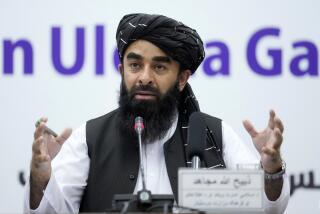Afghan Talks Resume; Kabul Shift Clouds Chances
- Share via
GENEVA — Indirect talks between Afghanistan and Pakistan on a peace settlement in Afghanistan resumed here Monday, but because of the change in Afghan leadership there was little hope for progress toward an early agreement.
Diego Cordovez, the U.N. mediator, said after meeting separately with the Afghan and Pakistani foreign ministers, “We have reached a very decisive stage, and I am extremely concerned about the consequences for the people of Afghanistan if we fail.”
Cordovez, a U.N. undersecretary general, refused to comment on the leadership change in Kabul announced Sunday, in which President Babrak Karmal was replaced as Communist Party general secretary by the security police chief, a major general named Najibullah (no first name).
This is the seventh round of these talks, which began in 1982, and Cordovez said he expects it to last two or three weeks. He emphasized that it will be the last round he mediates. If Afghanistan and Pakistan meet for an eighth round, the U.N. official said, it will be face to face.
The agenda, according to Cordovez, has been pared to one significant issue--setting a timetable for withdrawal of Soviet troops in Afghanistan, now estimated to number 115,000. Pakistan wants the Russians out within six months of a settlement, but the Kabul government--which was first installed with Moscow’s help and is effectively a Soviet client--wants them to stay longer, perhaps as long as four years.
Some Agreement Reported
Cordovez said that some points in an agreement have been “virtually completed”--among them a declaration of noninterference in Afghanistan’s internal affairs by outside countries, arrangements for the return of 3 million Afghan refugees from Pakistan plus 1 million from Iran, and a statement of joint guarantee of the settlement by the United States and the Soviet Union.
Cordovez, an Ecuadorean, met for about an hour Monday with the Pakistani foreign minister, Sahabzada Yakub Khan, and then moved to another suite in the National Palace here to spend an hour with the Afghan foreign minister, Mohammed Dost. Both delegations were asked to observe strict secrecy.
At previous meetings, the Afghans refused to discuss a possible timetable for the withdrawal of Soviet forces unless the two sides could meet face to face. But on this occasion, they accepted the indirect arrangement.
Soviet leader Mikhail S. Gorbachev has said a number of times that he is ready to withdraw Soviet forces from Afghanistan once there is no longer any “outside interference” that requires them to stay. The phrase refers to U.S., Chinese and Pakistani support for the Afghan rebels.
The Soviets, in moving Najibullah up to the party leadership in Kabul, appear to be hoping to strengthen the Communist regime there and bring the domestic situation under control so that they can seriously consider a withdrawal.
More to Read
Sign up for Essential California
The most important California stories and recommendations in your inbox every morning.
You may occasionally receive promotional content from the Los Angeles Times.










